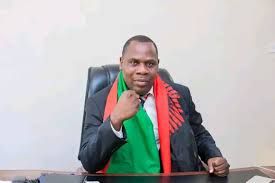By Linda Kwanjana
The Human Rights Defenders Coalition (HRDC) on Sunday released an end-of-year statement in which the rights and governance body has gone flat out attacking the current administration for a year it described a the most painful year for Malawians.
However, damning revelations indicate that the statement has been a one man show by HRDC Chairperson Gift Trapence while all the regional chapters which include the Central, South, East and the North have distanced themselves from the write up.
Surprisingly, Trapence’s statement has highlighted issues on Persistent Fragile Economy; The Lingering Hunger Crisis; lack of Respect for People’s Freedoms; Troubled Management of AIP; and Poor Handling of Refugee Relocation while systematically ignoring all the positives in these areas.
“This statement does not adequately reflect a collective position of HRDC especially from the chapters. We have never met as chapters to discuss the position as reflected. It is clear that all that has been presented are the imaginations of Mr Trapence,” said one leader from one of the chapters.

The chapter leader said for example, the statement was supposed to highlight the positives that have come out of the IMF’s approval of the Extended Credit Facility as well as the subsequent devaluation on the kwacha.
“We have seen trickling in of financial packages amounting to over MK 1 trillion from World Bank, UK, US, Iceland, Israel and these bodies and countries cited due sound economic policies aimed at resuscitating the troubled economy but none of these developments are reflected in the statement,” he added.
The regional leader emphasized the need for a more inclusive decision-making process within the coalition and expressed concerns that the central leadership had not considered the diverse perspectives from different regions.
Traditionally, the HRDC has been a united force, standing as a formidable watchdog against any infringements on human rights and democratic principles. The lack of endorsement from regional chapters, geographically dispersed across Malawi, send a louder voice than any words spoken on the current status of HRDC. It signified a notable fracture within the coalition, suggesting that the leadership’s stance did not resonate with those on the ground.
It is evident that this divergence of opinions within the HRDC was not merely a surface-level disagreement, it symbolized a deeper-rooted issue—a loss of confidence in the leadership that had guided the coalition through various challenges. The HRDC had, until this moment, been a unified force, garnering respect for its unwavering commitment to human rights advocacy.
Analysts have since speculated on the reasons behind the divergence, questioning whether it was a result of strategic differences, communication breakdowns, or a fundamental shift in the coalition’s priorities. Some argued that the HRDC’s leadership may have overreacted, alienating regional chapters by not adequately consulting them before issuing the year-end statement.
This internal discord has not only been felt within the HRDC but also among civil society members, who had long looked to the HRDC for guidance, as they were left in a state of uncertainty and confusion. One CSO leader argued that the loss of a united front within HRDC raises questions about the effectiveness of the coalition in advocating for human rights if its own internal dynamics are in disarray.
The CSO leader also urged the HRDC leadership to engage in a transparent dialogue with regional chapters, fostering an environment where diverse voices could be heard and respected.
“The unity that had defined the HRDC’s strength needed to be restored for the coalition to regain its credibility as a champion of human rights in Malawi. As it is the HRDC found itself at a crossroads. The internal divisions necessitate introspection,” she added.


